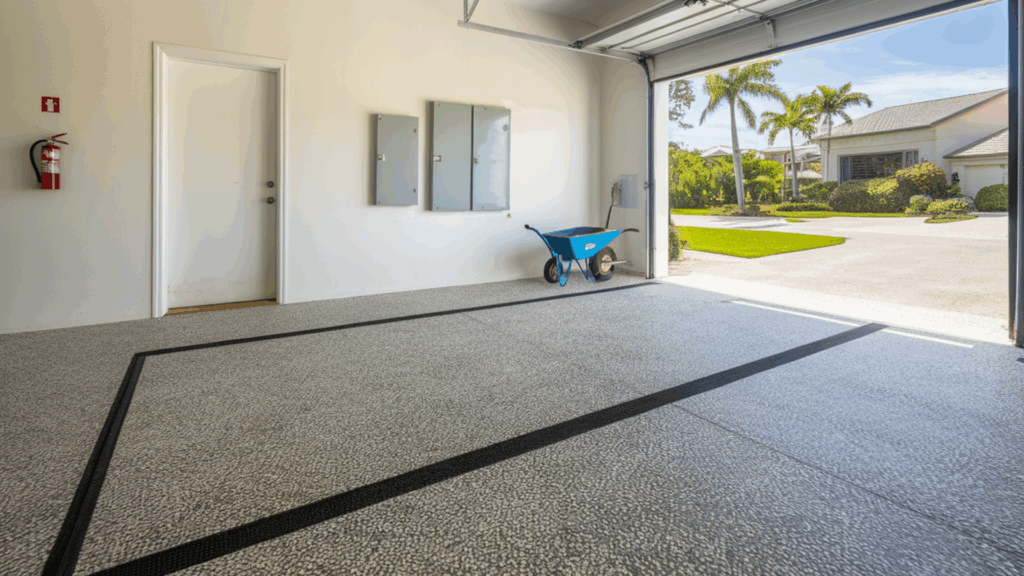When it comes to home improvement, garage flooring is often overlooked. However, your garage floor is exposed to a lot of wear and tear, from vehicles and equipment to spills and stains.
I remember when I first considered updating my own garage floor; it had cracks, stains, and just didn’t look great.
After researching different options, I decided to go with epoxy flooring, and I’ve never looked back. It’s durable, easy to clean, and looks fantastic.
In this article, I’ll walk you through the pros and cons of epoxy floors, helping you decide if it’s the right fit for your garage.
I’ll cover everything from installation challenges to how well epoxy stands up to heavy use. By the end, you’ll have a clear understanding of what epoxy flooring offers and whether it meets your needs.
What Is Epoxy Flooring and How Does It Work?
Epoxy flooring is a durable coating applied to concrete floors, made by combining resin and hardener.
This creates a tough, protective layer that strengthens your garage floor, making it resistant to stains, oil, and heavy impacts.
The resin and hardener bond tightly with the concrete, creating a solid, long-lasting finish.
Epoxy also gives your floor a smooth, glossy look that’s easy to clean, preventing dirt and spills from soaking in.
Overall, epoxy flooring enhances both the appearance and function of your garage while reducing the need for constant maintenance.
How Epoxy Floors Handle Heavy Traffic and Tough Conditions?

Epoxy flooring is designed to withstand the tough conditions typical of garages, offering strength, durability, and long-term performance. The key benefits are:
- Durability: Epoxy can handle foot traffic, heavy vehicles, and large equipment without getting damaged.
- Oil, Chemical, and Stain Resistance: Epoxy floors don’t absorb spills, making cleanup easy and preventing stains from setting in.
- Impact and Scratch Resistance: Epoxy absorbs impacts and resists scratches, so your floor stays intact even under heavy use.
- Long-Lasting Protection: The tough coating ensures your garage floor remains in great shape for years, with minimal maintenance.
Overall, epoxy flooring is the ideal solution for a garage floor that withstands spills, scratches, and heavy use while maintaining cleanliness and functionality.
The Advantages of Epoxy Garage Floors
Epoxy garage floors are more than just a functional flooring option; they offer numerous advantages that make them a solid choice for homeowners.
1. Durability
Epoxy flooring provides a highly durable surface that protects your garage floor from daily wear and tear.
Unlike regular concrete, epoxy forms a strong, seamless coating that can handle heavy foot traffic, vehicles, and equipment.
Its durable surface resists cracks, chips, and stains, even under harsh chemicals or extreme weather.
This durability makes it an ideal choice for garages, where constant use and heavy-duty activity can cause wear on traditional flooring materials.
2. Easy Maintenance
The smooth, non-porous surface of epoxy floors makes cleaning a breeze.
Unlike concrete, which absorbs stains, oil, and dirt, epoxy prevents these substances from soaking in.
This means you can quickly clean up spills or messes without worrying about lingering odors or stains.
A simple sweep and mop are all it takes to keep your garage floor looking fresh and new.
This low-maintenance quality makes epoxy ideal for those who want a clean, functional garage without the constant upkeep of other flooring materials.
3. Design Flexibility
Epoxy flooring offers wide customization options, allowing you to choose from various colors, finishes, and patterns.
Whether you prefer a sleek, glossy look or a more matte finish, there’s an epoxy option for your style.
You can even add decorative flakes or textures for a unique appearance. This flexibility lets you design a garage floor that matches your personal taste and complements the overall look of your garage.
With so many choices, epoxy gives you the opportunity to transform your garage into a space that’s both functional and visually appealing.
4. Safety
Adding anti-slip additives to epoxy floors increases safety, especially in areas where oil or water may spill.
These additives create extra traction, reducing the risk of slipping and falling, which is important in high-traffic areas like a garage.
Epoxy floors can be slippery when wet, but the addition of these safety features ensures that your garage remains safer to walk on, even when conditions are less than ideal.
This is especially helpful in preventing accidents in areas with frequent foot or vehicle traffic.
5. Cost-Effective in the Long Run
While the initial cost of installing epoxy flooring might be higher than other options like paint or tiles, it offers long-term savings.
Epoxy floors last much longer than traditional flooring, which means you won’t have to worry about replacing or repairing them frequently.
Their durability also means less maintenance over the years, saving you both time and money.
When you factor in the reduced upkeep costs, epoxy floors end up being a more cost-effective investment over time, providing value that other flooring options simply can’t match.
The Disadvantages of Epoxy Garage Floors
Epoxy installation requires careful attention, and there are some challenges to keep in mind. This is a closer look at the disadvantages of epoxy garage floors.
1. Complex Installation
Installing epoxy flooring is not a DIY job for most homeowners. It requires specific skills and knowledge to ensure a proper application.
The process includes several steps, such as preparing the surface, properly mixing the epoxy, and applying it evenly.
Additionally, the curing time can take several days, meaning you’ll have to wait before you can use your garage again.
This complexity makes professional installation the best option for many people.
2. Slipperiness
Epoxy floors can become slippery when wet, which can pose a safety risk, especially in high-traffic areas.
Water, oil, or other spills on the floor can create a slick surface, increasing the chances of slipping. To combat this issue, anti-slip additives can be mixed into the epoxy during installation.
These additives help create a textured surface that increases traction, making it safer to walk on, particularly in garages where spills are common.
Without these additives, the risk of slipping remains a concern.
3. Temperature Sensitivity
Epoxy flooring is sensitive to extreme temperatures, which can impact the installation process. When temperatures are too cold or too hot, it can affect how the epoxy cures.
In colder climates, epoxy may take longer to harden or fail to bond properly, leading to a weaker surface.
Additionally, in regions with severe weather conditions, temperature fluctuations can cause the epoxy to crack over time.
This sensitivity means that installation timing and environmental conditions need to be carefully considered to avoid long-term issues.
4. Odor During Application
The application process for epoxy flooring can release strong chemical odors into the air.
These fumes can be unpleasant and even harmful if proper ventilation is not in place.
It’s important to ensure your garage is well-ventilated during installation and for some time after, to clear out any lingering smells.
If you’re sensitive to odors or chemicals, this could be a concern during the application process, so be sure to take the necessary precautions to protect yourself.
5. Surface Preparation
For epoxy flooring to work effectively, the concrete surface must be in good condition. This means any cracks, holes, or imperfections must be repaired before applying the epoxy.
If the surface isn’t properly prepared, the epoxy may not adhere well, which can lead to issues like peeling or bubbling over time.
The surface must also be thoroughly cleaned and dried to ensure the epoxy bonds correctly.
This preparation can be time-consuming and may require additional steps, adding to the overall cost.
Do Epoxy Garage Floors Require Special Maintenance?
Epoxy garage floors are easy to maintain, but regular upkeep is essential to keep them looking great. Below are some simple maintenance tips:
- Sweeping and Mopping: Regular sweeping and damp mopping will remove dirt and spills. Avoid soaking the floor to prevent damage.
- Avoid Harsh Chemicals: Steer clear of bleach, ammonia, or other harsh cleaners that can damage the epoxy finish.
- Periodic Inspections: Check for cracks or damage regularly and repair them quickly to maintain strength.
- Protect from Abrasive Objects: Avoid heavy equipment or rough usage that could wear down the surface.
By following these easy steps, your epoxy floor will remain durable, functional, and looking like new for years.
How Long Do Epoxy Garage Floors Typically Last?
Epoxy garage floors can last anywhere from 10 to 20 years, depending on several factors.
The quality of the installation plays a big role in how long your floor will last. A professional installation ensures the epoxy bonds well to the surface and holds up over time.
Environmental factors, like extreme temperatures or frequent exposure to chemicals, can also impact the lifespan of the flooring. In addition, how well you take care of your floor makes a difference.
Regular maintenance, like cleaning and repairing small cracks, can help extend its life.
Protecting the floor from heavy or abrasive objects also prevents wear. If properly maintained, your epoxy garage floor can easily last on the longer end of the lifespan range, keeping your garage looking great for many years.
Conclusion
Epoxy flooring offers many benefits for your garage. When I installed epoxy in my own garage, I noticed improvement in both the appearance and function of the space.
However, it does come with some challenges, such as the need for proper installation and maintenance, along with potential slipperiness when wet.
I had to be careful during the application process and make sure it was done right to avoid issues later on.
I suggest evaluating your garage’s specific needs and thinking about how epoxy flooring could improve your space. Also, consider your budget and the amount of traffic your garage experiences.
In the end, epoxy flooring is a long-term investment that can add both value and functionality to your garage.
If you want a durable and attractive floor, epoxy is certainly worth considering.

